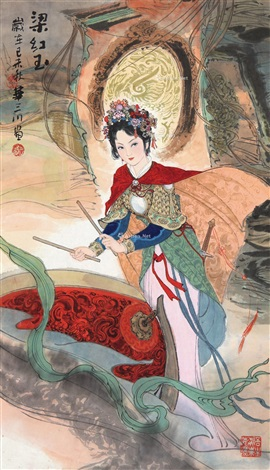
Mulan is no doubt a household name for Chinese people. “The Ballad of Mulan”, a poem dated back to the fifth or sixth century C.E., has been in Chinese textbooks since the early 1900s. Almost every kid in Chinese middle schools knows Mulan’s story well and can recite at least part of the poem.
Although Mulan is probably the most famous female warrior, there were also many other inspiring female icons in ancient China. Let’s get to know two fearless women: Liang Hongyu and Qin Liangyu.
-
1 梁红玉 Liang Hongyu

Living in the Song dynasty (960 C.E. - 1279 C.E.), Lady Liang was born to a respected family with a long military tradition. Growing up watching her father and brothers undergoing military training, Liang naturally became well-versed in martial arts. She enjoyed a happy life until her father and grandfather, who both served as generals in the Song army, failed to defeat the Fang La Rebellion. All of a sudden, Lady Liang’s family’s status plummeted, and she was forced to become an army courtesan.
Once, Lady Liang entertained at a military banquet in celebration of a victory of General Han Shizhong (韩世忠). He didn’t look happy, so Lady Liang approached him. General Han told her that such a small win couldn’t set his mind at ease as the rebels might come back at any time. Liang thus had great respect for the general, and the like-minded pair soon fell in love and got married.
 General Han Shizhong
General Han ShizhongHer marriage to the general made Lady Liang recognize the military spirit deep in her soul. In 1129, two high-ranking government officials staged a coup. The rebels held Liang and her son as hostages to hold back General Han’s troops. Liang was sent to persuade her husband to join the uprising. She first pretended to comply, but in reality, she urged the general to fight the rebels, neglecting their son’s safety. Fortunately, General Han defeated the coup. Lady Liang’s courage and loyalty deeply moved the Song emperor. As a result, she became the first woman in history to receive a stipend from the imperial court.
But what made Lady Liang most famous was when she defeated the Jurchen army later in the same year. The domestic turmoil in the Song dynasty gave the Jurchen an opportunity to attack the South. Though the Jurchen army outnumbered the Song army, Liang and Han won the battle. Han fought with his army on the river while Liang signaled the army with drums and flags.
 Lady Liang depicted in Beijing opera
Lady Liang depicted in Beijing operaSince then, Lady Liang continued to fight alongside her husband and won numerous battles. Her extraordinary military skills and bravery gained her fame. Hundreds of years later, Lady Liang’s shrine is still worshipped in Huaian, where she was born.
 The shrine to Liang Hongyu
The shrine to Liang Hongyu -
2 秦良玉 Qin Liangyu
Qin Liangyu was a well-known female general in the late Ming dynasty. Before Qin Liangyu, regardless of how exemplary a female icon was, her story would be recorded separate from the men’s by the imperial historians. Qin was the first and the only heroine with her biography documented in the official dynastic history, alongside the heroes’.
Qin’s record begins with her marrying Ma Qiansheng (马千乘), a local governor of the Shizhu County. She had a wonderful relationship with her husband and accompanied him in battles against the local warlords. And yet, in 1613, Ma was falsely accused by an influential court eunuch and thrown in jail. After Ma passed away in jail, Qin Liangyu succeeded his position.

Qin was courageous and resourceful, good at both archery and horse-riding. She was composed and refined, and also strict in training her soldiers.
In 1630 when the Qing army besieged the capital, Qin led her army from Sichuan as reinforcements. She used her own family’s wealth to feed her soldiers. The Chongzhen Emperor was impressed by her performance and composed four poems to recognize her feat. He commented that “[General Qin] has always been ready to fight for the country. Why must a general be a man? ”(“由来巾帼甘心受,何必将军是丈夫”。Yóu Lái Jīn Guó Gān Xīn Shòu, Hé Bì Jiāng Jūn Shì Zhàng Fū )
From a Confucious perspective, Mulan, Lady Liang and Qin Liangyu all possessed the ultimate qualities: bravery, loyalty to the country and commitment to the family. Their legendary stories have inspired Chinese people for generations.



0 Comments